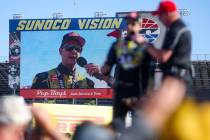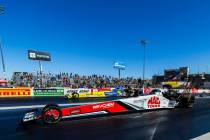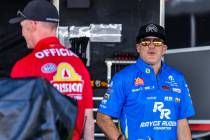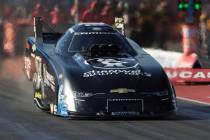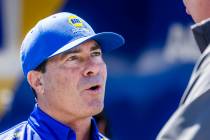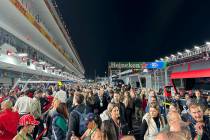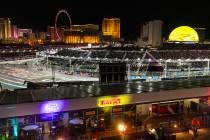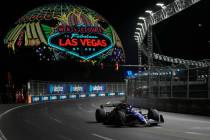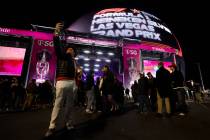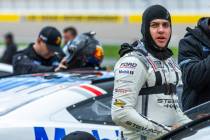NASCAR problems come to light
The Chase for the Championship shouldn't be when NASCAR has to defend basic tenets of its sport and moronic decisions.
But skeptics of racing's legitimacy are loading up.
It started with the Nextel Cup race two weeks ago in Kansas. The home to "The Wizard of Oz" was an appropriate place for NASCAR rulings to look like a bad dream. The checkered curtain was pulled to reveal races aren't ruled by an omniscient potentate.
The Sept. 30 event was farcical for two reasons: The race was restarted after a second rain delay caused it to be shortened but ended prematurely in the dark because the track doesn't have lighting, and the first driver to cross the finish line -- Clint Bowyer -- didn't win.
The darkness at Kansas -- symbolic and real -- exposed NASCAR for too many free-wheeling calls and rules that leave too much room for interpretation.
The last green-flag laps came to a halt with four to go. Debris was strewn along the backstretch after Juan Pablo Montoya's car lost a tire and officials deemed it would be too dark to race again once the track was cleaned.
So instead of drivers having one chance at a two-lap overtime, Greg Biffle was to lead the slow parade for three laps before the checkered flag would be waved.
But Biffle slowed on the track to conserve fuel and fell out of sync with the pace car. There's a reason why it's called a "pace car." Biffle became the third car to cross the finish line under yellow but was declared the winner because NASCAR freezes the order when the yellow flag comes out.
But if you can't maintain the pace, you shouldn't be able to win the race. Oz's favorite mutt, Toto, could have made a better ruling. The brainless Scarecrow couldn't have done worse.
Biffle also should drawn the black flag and been penalized a lap for admittedly removing his safety harness along with dropping the protective net on his side window during the final caution laps.
Bad decisions carried over to Sunday's race in Talladega, Ala., when NASCAR first allowed the race to serve as a test session for Formula One champ Jacques Villeneuve.
The Talladega race, known for its use of horsepower-choking restrictor plates and multicar crashes, was not one where Villeneuve should have raced a stock car for the first time. To his credit, the veteran dropped from the sixth spot he earned in qualifying to the rear of the pack before the green flag flew.
It ended with Jeff Gordon playing the role of the tortoise and cruising safely through the first 450 miles mid-pack or worse before shifting up to passing gear over the last 50 miles. He took his lone lead on the last lap and held on to win.
Gordon and his team should be commended for formulating a winning game plan, but it was one that will further alienate fans and television viewers from watching races start to finish. He made the 3-hour, 29-minute marathon a 5-minute thriller. But it made most of the race moot and put added value on digital recording devices with fast forward, a speed he didn't use until the gun lap.
There are reasons why only a few Cup races this year have posted increased television ratings over last year. Included in that select group was the March race at Las Vegas Motor Speedway.
Granted, about 6 million have watched each of the Chase races shown on ABC, but the downward trend should have NASCAR considering a switch to earlier starting times and shorter races.
NASCAR has to inject more excitement into its races and be more specific when creating rules and guidelines.
Shortening most races is a good start, and more incentives are needed to encourage all-out racing.
That can be aided by providing points for each lap led. Were that in place at Talladega, Gordon wouldn't have been content to hold back until the last few laps.
It also should deem a track unworthy of being among the prestigious 10 in the Chase if it doesn't have track lighting; half of those 10 tracks don't -- including Kansas, Talladega and Martinsville, Va. International Speedway Corp., which is NASCAR's kissin' cousin, owns those three.
If a track is too cheap to install lights, then it shouldn't be given a Cup race, especially not one of the year's 10 most important.
The spotlight on NASCAR is growing dimmer.
Jeff Wolf's motor sports column is published Friday. He can be reached at 383-0247 or jwolf@reviewjournal.com.
JEFF WOLFMORE COLUMNS








